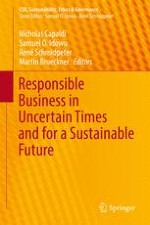2019 | OriginalPaper | Buchkapitel
CSR, Sustainability and Green IT in Higher Education: An Australian Perspective
verfasst von : Tomayess Issa, Theodora Issa
Erschienen in: Responsible Business in Uncertain Times and for a Sustainable Future
Verlag: Springer International Publishing
Aktivieren Sie unsere intelligente Suche, um passende Fachinhalte oder Patente zu finden.
Wählen Sie Textabschnitte aus um mit Künstlicher Intelligenz passenden Patente zu finden. powered by
Markieren Sie Textabschnitte, um KI-gestützt weitere passende Inhalte zu finden. powered by
